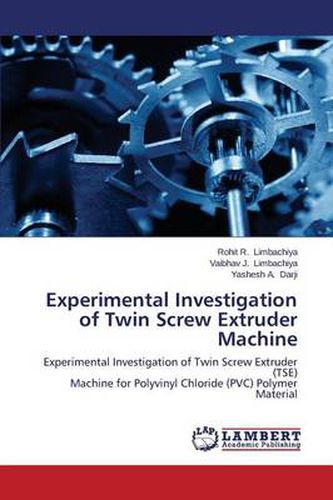Readings Newsletter
Become a Readings Member to make your shopping experience even easier.
Sign in or sign up for free!
You’re not far away from qualifying for FREE standard shipping within Australia
You’ve qualified for FREE standard shipping within Australia
The cart is loading…






This title is printed to order. This book may have been self-published. If so, we cannot guarantee the quality of the content. In the main most books will have gone through the editing process however some may not. We therefore suggest that you be aware of this before ordering this book. If in doubt check either the author or publisher’s details as we are unable to accept any returns unless they are faulty. Please contact us if you have any questions.
The Twin screw extruder machining process (TSE) is a one of the plastic extrusion technology. The quality of parts produced by the TSE machining is significantly affected by various parameters used in the process. In this present research, Effect of TSE machine processing parameters such as screw speed, barrel temperature and die zone temperature on the mechanical properties was investigated by full factorial design methodology. Three different levels of screw speed (35 rpm, 40 rpm, 45 rpm), barrel temperature (175 C Degrees, 180 C Degrees, 185 C Degrees) and die zone temperature (190 C Degrees, 195 C Degrees, 200 C Degrees) were selected. The response parameters were tensile strength and impact strength of the Polyvinyl chloride (PVC) polymer material. Investigation of the statistical-mathematical analysis results perform by the ANOVA and Regression analysis in MINITAB software that the optimum processing conditions for the PVC polymer material, to achieve the maximum tensile strength and impact strength are screw speed at 45 rpm, barrel temperature at 185 C Degrees and die temperature at 200 C Degrees.
$9.00 standard shipping within Australia
FREE standard shipping within Australia for orders over $100.00
Express & International shipping calculated at checkout
This title is printed to order. This book may have been self-published. If so, we cannot guarantee the quality of the content. In the main most books will have gone through the editing process however some may not. We therefore suggest that you be aware of this before ordering this book. If in doubt check either the author or publisher’s details as we are unable to accept any returns unless they are faulty. Please contact us if you have any questions.
The Twin screw extruder machining process (TSE) is a one of the plastic extrusion technology. The quality of parts produced by the TSE machining is significantly affected by various parameters used in the process. In this present research, Effect of TSE machine processing parameters such as screw speed, barrel temperature and die zone temperature on the mechanical properties was investigated by full factorial design methodology. Three different levels of screw speed (35 rpm, 40 rpm, 45 rpm), barrel temperature (175 C Degrees, 180 C Degrees, 185 C Degrees) and die zone temperature (190 C Degrees, 195 C Degrees, 200 C Degrees) were selected. The response parameters were tensile strength and impact strength of the Polyvinyl chloride (PVC) polymer material. Investigation of the statistical-mathematical analysis results perform by the ANOVA and Regression analysis in MINITAB software that the optimum processing conditions for the PVC polymer material, to achieve the maximum tensile strength and impact strength are screw speed at 45 rpm, barrel temperature at 185 C Degrees and die temperature at 200 C Degrees.